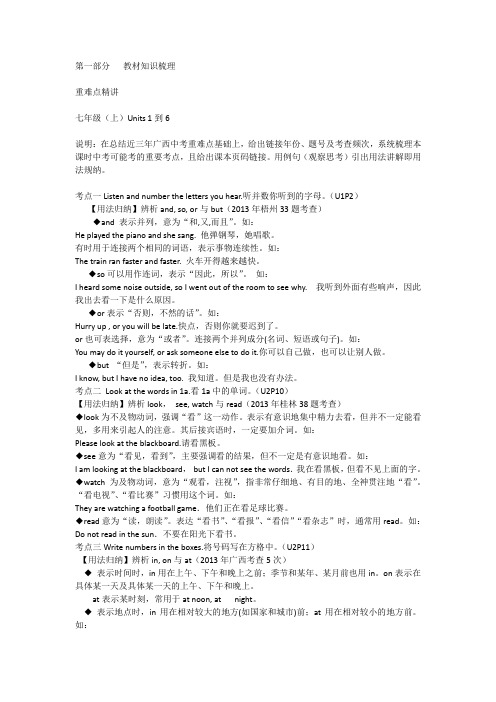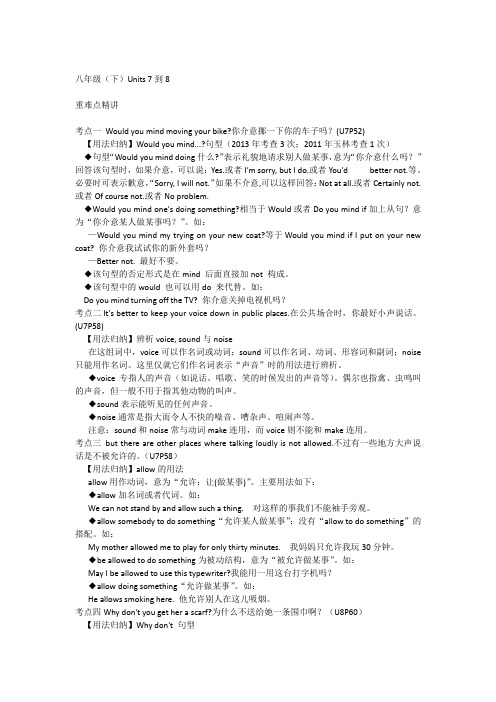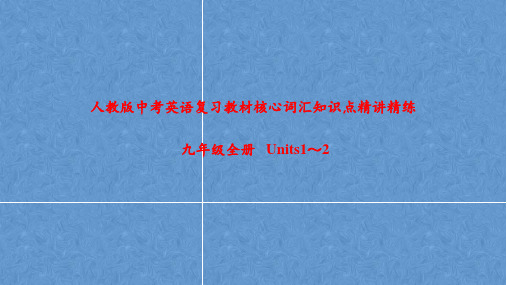【直击中考】广西中考英语总复习 第一部分 教材知识梳理 九全 units 1-2
- 格式:doc
- 大小:33.00 KB
- 文档页数:3

九年级(全)Units 1到2重难点精讲考点一Do you learn English by watching English language videos?你是通过看英语录像片的方式学习英语的吗?(U1P3)【用法归纳】by的用法by作介词时,后接动词的i n g形式,意思是“通过什么方式(途径)”,表示方式、手法。
如:Mr Green makes a living by teaching.格林先生以教书为生。
I study by working with a group.我通过小组合作来学习。
【知识拓展】by的其他用法:◆“通过(某人/某物)”。
如:He went by the supermarket on his way to school. 在上学的路上,他通过那家超市。
◆“在什么隔壁;在什么周围”。
如:Li Lei sits by my side in the classroom. 在教室里,李雷坐在我的隔壁。
◆“在什么之前;不迟于”。
如:I can finish doing my homework by six o'clock. 我能在6点之前做完作业。
◆表示交通方式,意为“乘;坐”。
如:I usually go to school by bike. 我通常骑自行车去上学。
◆“被;由”,后接动作的执行者,经常使用于被动语态。
如:The window was broken by Sally.窗户是被萨利弄坏的。
◆固定短语:by the way “顺便说一下”;by accident “偶然;可巧”;by mistake“由于过失;由于疏忽”。
如:By the way, I forgot to tell you the news. 哦,对了,我忘记告知你那个消息了。
Sorry, I took your umbrella by mistake. 对不起,我错拿了你的雨伞。
考点二She added that having conversations with friends was not helpful at all.她补充说,和朋友交谈一点帮忙都没有。

九年级(全)Units 9到10重难点精讲考点一It is used for scooping really cold ice cream.这是用来舀冰淇淋的。
(U9P69)【用法归纳】be used for的用法be used for表示“被用来做什么”,介词for表示目的或用途,后面接名词或动词的i n g形式。
如:Wood can be used for making paper.木材可以被用来造纸。
【知识拓展】含有be used的常用短语:◆be used as表示“被用作”,介词as是“作为”的意思,其后一般接名词,强调使用的工具及手段。
如:This book can be used as a textbook.这本书可以当作教科书来用。
◆be used by表示“被谁使用”,by后接动作的执行者。
如:This kind of machine is used by farmers for getting in crops.这种机器被农民们用来收割庄稼。
考点二 The potato chips were invented by mistake.薯条是在偶然的情况下被发明的。
(U9P71)【用法归纳】辨析invent, discover, create, find与find out◆invent 意为“发明,创造”,指通过研究和实验而“创造,发明”出前所未有的产品或装置。
如:He invented a new method to make bread. 他发明了一种做面包的新方法。
◆discover 意为“发现,找到”,表示发现过去就存在但尚未被人发现或知晓的事物,如地点、物体或事实等,名词形式是discovery。
如:Did Columbus discover America in fourteen ninty two? 哥伦布在1492年发现了美洲吗?◆create指从无到有“创作”或创作出原本不存在的东西,如艺术作品、理论等。

第一部分教材知识梳理重难点精讲七年级(上)Units 1到6说明:在总结近三年广西中考重难点基础上,给出链接年份、题号及考查频次,系统梳理本课时中考可能考的重要考点,且给出课本页码链接。
用例句(观察思考)引出用法讲解即用法规纳。
考点一Listen and number the letters you hear.听并数你听到的字母。
(U1P2)【用法归纳】辨析and, so, or与but(2013年梧州33题考查)◆and 表示并列,意为“和,又,而且”。
如:He played the piano and she sang. 他弹钢琴,她唱歌。
有时用于连接两个相同的词语,表示事物连续性。
如:The train ran faster and faster. 火车开得越来越快。
◆so可以用作连词,表示“因此,所以”。
如:I heard some noise outside, so I went out of the room to see why. 我听到外面有些响声,因此我出去看一下是什么原因。
◆or表示“否则,不然的话”。
如:Hurry up , or you will be late.快点,否则你就要迟到了。
or也可表选择,意为“或者”。
连接两个并列成分(名词、短语或句子)。
如:You may do it yourself, or ask someone else to do it.你可以自己做,也可以让别人做。
◆but “但是”,表示转折。
如:I know, but I have no idea, too. 我知道。
但是我也没有办法。
考点二Look at the words in 1a.看1a中的单词。
(U2P10)【用法归纳】辨析look,see, watch与read(2013年桂林38题考查)◆look为不及物动词,强调“看”这一动作。
表示有意识地集中精力去看,但并不一定能看见,多用来引起人的注意。

八年级(上)Units 7到9重难点精讲考点一Turn on the blender.打开搅拌器。
(U7P41)【用法归纳】辨析turn on, turn off, turn up与turn down(2021年河池36题考查)turn on“打开(电器等)”turn off“关掉(电器等)”turn up“开大,调高(音量)”turn down“关小,调低(音量)”如:Miss Wang walked into the room and turned on the light.王小姐走进房间,打开了灯。
He turned on the computer and got online.他打开电脑上网。
注意:on, off, up, down这四个词都是副词,在利用进程中,当宾语为代词时,只能置于动词和副词之间;当宾语为名词时,既可置于动词和副词之间,也可置于副词以后。
如:Turn it on. 打开它。
Turn the gas off.等于Turn off the gas. 把煤气关了。
考点二At the end of the day, the science teacher was very happy because the class monitor cleaned the bus after the trip. 在那天终止时,科学教师很快乐,因为班长在旅行后把车打扫干净了。
(U8P49)【用法归纳】辨析at the end of, by the end of与in the end◆at the end of “在什么末或底”,既可接时刻,也可接地址名词。
反义短语:at the beginning of “在什么初或起点”。
◆by the end of “到什么末或底为止”,经常使用于以后时或过去完成时。
◆in the end等于at last等于finally “最后”,经常使用于一样过去时。

八年级(下)Units 7到8重难点精讲考点一Would you mind moving your bike?你介意挪一下你的车子吗?(U7P52)【用法归纳】Would you mind...?句型(2013年考查3次;2011年玉林考查1次)◆句型“Would you mind doing什么?”表示礼貌地请求别人做某事,意为“你介意什么吗?”回答该句型时,如果介意,可以说:Yes.或者I'm sorry, but I do.或者You'd better not.等。
必要时可表示歉意,“Sorry, I will not.”如果不介意,可以这样回答:Not at all.或者Certainly not.或者Of course not.或者No problem.◆Would you mind one's doing something?相当于Would或者Do you mind if加上从句?意为“你介意某人做某事吗?”。
如:—Would you mind my trying on your new coat?等于Would you mind if I put on your new coat? 你介意我试试你的新外套吗?—Better not. 最好不要。
◆该句型的否定形式是在mind 后面直接加not 构成。
◆该句型中的would 也可以用do 来代替。
如:Do you mind turning off the TV? 你介意关掉电视机吗?考点二It's better to keep your voice down in public places.在公共场合时,你最好小声说话。
(U7P58)【用法归纳】辨析voice, sound与noise在这组词中,voice可以作名词或动词;sound可以作名词、动词、形容词和副词;noise 只能用作名词。
这里仅就它们作名词表示“声音”时的用法进行辨析。

广西2017中考英语复习第一部分教材同步复习篇第19课时九上 Modules 11-12试题外研版第十九课时九年级(上) Modules 11~12I。
单项选择。
(D)1。
—Danny, I have great_______in finishing my homework by myself.Could you help me?—No problem.A. fun B。
success C。
advice D. difficulty(A)2。
When we received the letter from my father, my grandma askedme to _______ to her。
A. read it out B。
read it aboutC。
read out it D. read about it(D)3. —Long time no see! I think you _______a lot.—Yes, I used to be quiet,but now I’m outgoing。
A。
will change B。
were changingC. are changedD. have changed (B)4。
Mr。
Li is my favourite teacherA. so that B。
even thoughC。
as if D。
ever since(C)5。
Jimmy is very helpful。
_______I stay with him, _______ Ilike him。
A. The more; the most B。
The most; the mostC. The more; the moreD. The most; the more(B)6.—Look! Two young men are kickinga student over there.-Oh, we should take ______ to st op the fight.A. notesB. stepsC. turnsD。
八年级(下)Units 1到2重难点精讲考点一I think I will live in an apartment with my best friends, because I do not like living alone. 我认为我将会和我最好的朋友们住在公寓里,因为我不喜欢独处。
(U1P6)【用法归纳】辨析alone与lonely(2011年柳州50题考查)两者都作形容词,表示“寂寞的,孤单的”,但用法不同:◆alone 可用作形容词和副词,意为“单独,独自”,表客观事实。
一般在句中作表语,不作定语。
如:The old man lived alone in the village. 那个老人独自一人住在村子里。
◆lonely指精神上感到寂寞,或指地方比较偏僻,人迹罕至,具有一定的感情色彩,在句中既可作定语,又可作表语。
如:The poor man has no children, but he never feels lonely. 那个可怜的人没有孩子,但他从不感到寂寞。
She was taken to a lonely island. 她被带到了一个荒岛上。
考点二However,they agree it may take hundreds of years.然而,他们相信它花费了数百年。
(U1P8)【用法归纳】hundred的用法◆hundred与具体数字连用时,表示确切的数量概念,其中hundred用单数形式,且其后不能跟of。
如:two hundred student两百名学生◆hundreds of表示“数百的,成百上千的”,表示约数概念,不和表示具体数量的词搭配。
如:There are hundreds of students on the playground.操场上有成百上千的学生。
归纳thousand,million也有此用法。
thousands of “数千的”;millions of“数百万的。
考点跟踪突破21 九年级(上)Modules 9~10一、单项选择。
1.—The traffic is too busy.We have to drive slowly.—I think more new roads __A__ in our city.(2016,贺州)A.should be builtB.should builtC.have built D.build2.—What kind of TV show do you prefer?—I like the ones __C__ make me laugh.(2016,某某)A.who B.whom C.that D.what3.The environment here bees better and better.__A__ birds are ing back.(2016,某某)A.Thousands of B.Thousand ofC.Thousands D.Thousand4.Life is __A__ the unexpected.Whatever we do,try our best.(2016,某某) A.full of B.proud ofC.instead of D.because of5.It is said that the project connecting mainland and Hong Kong __D__ soon.(2016,潍坊)A.is pleted B.has pletedC.will plete D.will be pleted6.—Could you please __C__ me your notebook,Grace?—Certainly.Here you are.(2016,某某)A.borrow B.to borrow C.lend D.to lend7.My parents don't allow me __B__ late.(2016,某某)A.stay up B.to stay upC.stays up D.staying up8.Today,WeChat (微信) bees very popular,and more and more people like to use it to __B__ each other.(2016,某某)A.depend on B.municate withC.believe in9.Don't make me __A__ this or that when I am busy.A.do B.done C.to do D.doing10.They __A__ a notice to tell the students about the changed meeting time.A.put up B.put on C.put away D.put out11.Here is the book.First __B__ it and then tell me what you think of it.A.look into B.look throughC.look up D.look after12.—A new park __B__ in our home town next year.—Really? Our home town must be more beautiful.(2017,某某预测)A. will buildB. will be builtC. is built二、根据句意及汉语或首字母提示填写单词。
七年级(下)Units 1到4重难点精讲考点一The pay phone is between the post office and the library.公用电话在邮局和图书馆之间。
(U2P8)【用法归纳】辨析between与among(2011年桂林28题考查)between“介于(两者)之间”,常与and连用。
一般指两者之间。
若后接三者或三者以上事物或人时,是把这些事物或人分别看待,指每两者之间。
among一般用于三者或三者以上的人或物之间。
如:I always sit between Mum and Dad when we take photos. 拍照时,我总是坐在爸爸和妈妈中间。
There are many flowers between the trees. 这些树之间有许多花。
(此处指每两棵树之间都有花)They found a pear among the apples. 他们在那些苹果中发现了一个梨。
考点二It is across from the bank.它在银行对面。
(U2P8)【用法归纳】辨析across,over,through与pastacross介词,“横过,穿过”,着重强调从一边到另一边,指从表面通过。
over介词,“横过,越过”,指从上方经过、跨越。
through介词,“穿过,通过,经过”,指从空间内通过。
past介词,“经过”,指从旁边经过。
如:He walked across the field. 他走过田地。
The children ran over the grass.孩子们跑过草地。
The sand ran through my fingers.沙子从我的指缝间漏了下去。
He hurried past us without stopping.他匆匆走过我们身边,连停都没停。
考点三The pay phone is in front of the library.公用电话在图书馆前面。
九年级(全)Units 1到2重难点精讲考点一 Do you learn English by watching English language videos?你是通过看英语录像片的方式学习英语的吗?(U1P3)【用法归纳】by的用法by作介词时,后接动词的i n g形式,意思是“通过什么方式(途径)”,表示方法、手法。
如:Mr Green makes a living by teaching.格林先生以教书为生。
I study by working with a group.我通过小组合作来学习。
【知识拓展】by的其他用法:◆“经过(某人/某物)”。
如:He went by the supermarket on his way to school. 在上学的路上,他经过那家超市。
◆“在什么旁边;在什么附近”。
如:Li Lei sits by my side in the classroom. 在教室里,李雷坐在我的旁边。
◆“在什么之前;不迟于”。
如:I can finish doing my homework by six o'clock. 我能在6点之前做完作业。
◆表示交通方式,意为“乘;坐”。
如:I usually go to school by bike. 我通常骑自行车去上学。
◆“被;由”,后接动作的执行者,常用于被动语态。
如:The window was broken by Sally.窗户是被萨利弄坏的。
◆固定短语: by the way “顺便说一下”; by accident “偶然;碰巧”; by mistake “由于差错;由于疏忽”。
如:By the way, I forgot to tell you the news. 哦,对了,我忘记告诉你那个消息了。
Sorry, I took your umbrella by mistake. 对不起,我错拿了你的雨伞。
考点二 She added that having conversations with friends was not helpful at all.她补充说,和朋友交谈一点帮助都没有。
(U1P4)【用法归纳】at all的用法◆at all与not, no, nothing, nobody, nowhere等表示否定意义的词连用,用来加强否定意义,表示“完全不,一点儿都不,丝毫不”的意思。
如:He does not like swimming at all.他一点儿都不喜欢游泳。
There is nothing in the room at all.房间里面什么东西都没有。
◆not at all单独使用时,用来回答对方的感谢或道歉,相当于That is all right.You are welcome.等。
如:—Thank you very much for your help!非常感谢你的帮助!—Not at all.或者That is all right.或者You are welcome.别客气。
考点三 I make mistakes in grammar.我在语法上出错了。
(U1P5)【用法归纳】mistake的用法◆名词,“错误;过失”。
如:He made a mistake in his test yesterday. 他在昨天的测验中犯了一个错误。
◆动词,“误解;误认为”。
如:Sorry, I mistook you for my brother. 对不起,我把你误认为是我弟弟了。
◆by mistake为介词短语,意思为“错误地”。
如:I took your umbrella by mistake.我错拿了你的伞。
考点四 I was also afraid to speak in class, because I thought my classmates might laugh at me.我也害怕在班上讲话,因为我想同学们可能会嘲笑我。
(U1P6)【用法归纳】afraid的用法be afraid of(doing) something 害怕(做)某事be afraid to do something 害怕去做某事be afraid加that从句担心什么,害怕什么如:The little girl is afraid of dogs. 这个小女孩怕狗。
Tom is afraid to swim in the river alone. 汤姆不敢一个人在河里游泳。
I am afraid (that) I must go now.我恐怕现在就得走。
考点五 And unless we deal with our problems, we can easily become unhappy.而且,除非我们自己处理问题,否则我们很容易变得不高兴。
(U1P8)【用法归纳】unless的用法(2013年河池30题考查)◆unless作连词,意为“除非;如果不”,引导条件状语从句,遵守“主将从现”的原则。
如:I will not go to her birthday party unless I hear from her.除非我收到她的来信,否则我不去参加她的生日聚会。
◆unless相当于if什么not,两者可以互相转化。
如:We will go on a picnic unless it rains.等于We will go on a picnic if it does not rain.如果不下雨,我们就去野餐。
考点六How do we deal with our problems?我们应该怎样处理我们的问题呢?(U1P8)【用法归纳】辨析deal with与do with这两个短语都有“处理;对付”的意思,但搭配不同:deal with主要用于deal with something或how to deal with something;而do with主要用于do什么with something 或 what to do with something。
试比较:How do they deal with the coin?等于What do they do with the coin?他们是怎样处理这枚硬币的?考点七 Mario, you used to be short, did not you?玛里奥,你过去个子不高,对吗?(U2P10)【用法归纳】(1)used to do的用法◆used to意为“过去常常”,后接动词不定式,表示过去的习惯。
其否定式有两种: did not use to 或used not to。
疑问式有两种: Did什么use to什么? 或 Used什么to do 什么? 但常用第一种。
答语形式与did和used的形式一致。
(2)辨析used to do something, be used to doing something与be used to do something.◆used to do something 意为“过去常常做某事”,表示过去习惯性、经常性的动作或状态,和现在对比,暗示现在不做了。
to为不定式符号,后跟动词原形。
如:I used to go shopping on Saturdays, but now I no longer do so. 过去我经常星期六去购物,但现在我不再那样了。
◆be used to doing something意为“习惯于做某事”。
to 在这里是介词,后接名词或动名词。
如:The teacher is used to going to bed late in the evening. 那个老师习惯于晚睡觉。
◆be used to do something表示被动,意为“什么被用来做什么”。
如:Computers are used to help people do many things. 电脑被用来帮助人们做很多事情。
考点八She also told me that even though my father was no longer with us, he 她也告诉我,尽管父亲不再和我们在一起,但他(U2P16)【用法归纳】辨析no longer, no more, not什么any longer与not什么any more◆no longer等于not什么any longer, 指持续了一段时间的动作状态已“不再延续”,着重指时间方面,常与延续性动词连用。
如:He no longer lived in the small town after his parents died.自从他父母去世后,他就不再在那个小镇生活了。
◆no more等于not什么any more, 指某一反复发生的动作已“不再重复”,着重指重复次数方面,还可指程度上和数量上“不再”,常与非延续性动词连用。
如:Charlie does not play the violin any more.查理再没有拉小提琴。
注意:1. no longer与no more 不分开使用。
2. 在not什么any longer和not什么any more结构中,not常与动词、助动词或情态动词连用,而“不再怎么样”中的“怎么样”用在not与any longer或 any more中间。
如:They are no longer living here.等于They are not living here any longer. 他们不再住这儿了。
I see him no more.等于I do not see him any more. 我再也见不到他了。
考点九He was watching me and would always take pride in every thing good I do.他注视着我,并且总是对我做的一切好的事情感到自豪。
(U2P16)【用法归纳】辨析pride与proud (2013年钦州31题考查;2013年河池40题考查)◆pride是名词, 意为“骄傲,自豪”, 常用于take pride in短语中, 意为“对什么感到自豪”。
如:My father always takes pride in everything good I do. 我父亲总是为我做的一切好事而感到骄傲。
◆proud是形容词,意为“骄傲的,自豪的”, 常用在be proud of短语中,意为“为什么感到自豪”。
如:As Chinese, we are all proud of our great country. 作为中国人, 我们以伟大的祖国感到骄傲。